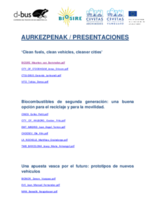Deployment of a new car-sharing fleet including electric and hybrid vehicles
Summary
Based on the initial success achieved by the fleet of self-service electric vehicles in La Rochelle, efforts were made to improve the existing car-sharing scheme by adopting a new management system and extending the user base.
Implementing sustainable mobility
A car-sharing scheme was first introduced in La Rochelle in 1999 in the framework of the LISELEC project. The LISELEC agency operated a fleet of 50 electric cars, available from seven pick-up stations every day of the week. Subscribers paid for car hire according to usage time and mileage totalled during the month.
Despite encouraging results, this scheme proved limited in terms of scope and functionality, and major technical difficulties with the operating equipment meant that service of a satisfactory quality could not be ensured.
The measure was therefore designed to implement a new system using new technologies, adapted for use in medium-sized towns.
Progress
A strategy was defined to find the best operating mode for the future by modifying the organisational and business links with the Urban Community of La Rochelle; subcontracting the whole system on a public market basis; and integrating the LISELEC scheme within a wider approach, grouping all electric vehicles operated in the Urban Community and establishing a public-private partnership for the whole management.
The scheme was targeted at those able to get rid of, or avoid buying, a second car; young people who do not own a car; employees needing to travel in the city; and tourists arriving in the city by train.
A new monitoring system was introduced based on a global positioning system to expand the facilities offered to subscribers. A non-stop hotline was also created for car-sharing users, along with Internet booking facilities, customer relations management and car maintenance management.
A simpler pricing strategy was also designed and the LISELEC ticketing system was integrated with the public transport network ticketing system.
Outcomes
The improved service resulted in increased numbers of subscribers to the system and fewer private cars in the city centre.
This fact sheet has been updated by a third party on the basis of available information (not by the city itself), therefore we do not guarantee any data with respect to their content, completeness or up-to-dateness.








